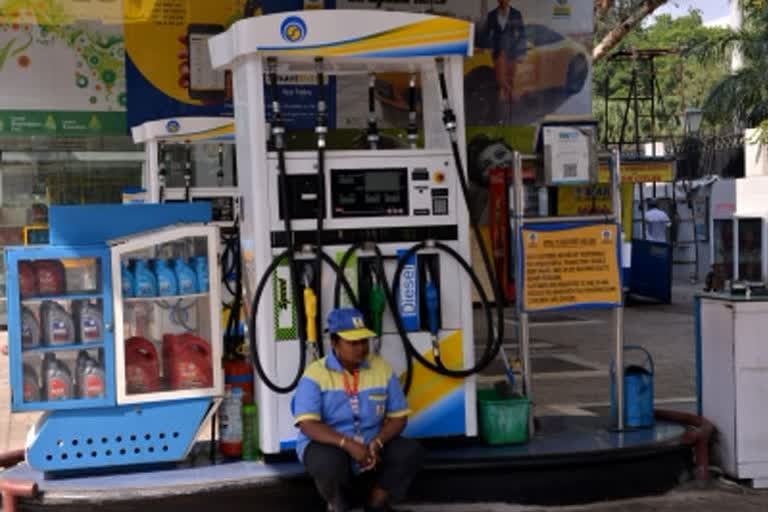Business Desk, ETV Bharat: As the OPEC plus declined to entertain India’s plea to increase crude oil production, the focus has now shifted to the options available for the government which can help in softening petrol and diesel prices that are at historical highs.
Petrol has already crossed Rs 100 per litre mark in parts of Rajasthan, Madhya Pradesh and Maharashtra, while it is fast approaching the three-digit level in rest of the country.
Similarly, the price of diesel is also on the rise and touched Rs 90 per litre mark in all the major metros.
Option 1: Using strategic reserves
Ahead of the OPEC plus meeting, Union Petroleum Minister Dharmendra Pradhan urged the group members to improve crude oil supplies so that India can provide petroleum products at reasonable prices to consumers. However, the OPEC plus declined to do so.
Responding to a question on India's pleas, Saudi energy minister Prince Abdulaziz bin Salman at a press conference after the OPEC+ decision said New Delhi should take some of the crude out of storage that they had purchased "very cheaply last year."
India had purchased 16.71 million barrels of crude in April-May, 2020 and filled all the three Strategic Petroleum Reserves created at Visakhapatnam in Andhra Pradesh and Mangalore and Padur in Karnataka.
As per official estimates, the average cost India paid for that crude was USD 19 per barrel, which is nearly one third sixty per cent less than the current crude oil price in the international market.
Also Read: OPEC, allies keep oil output unchanged, prices jump
However, this option is of little help as India consumes nearly 4 million barrels per day and the whole strategic reserves will be sufficient only for four days.
Option 2: Reducing taxes
While states like Assam and West Bengal have taken a lead by reducing taxes on petrol and diesel, opposition parties are demanding a major cut in taxes levied by the Centre.
As much as 60 per cent of the retail price of petrol is made up of central and state taxes. Taxes make up for about 56 per cent of the record high diesel rates.
Acknowledging that consumers have a case for petrol and diesel prices to be brought down, the Finance Minister Nirmala Sitharaman on Friday said a reduction in taxes to make that happen should be a joint call of the central and state governments.
While the burden on the consumers is "understood", the pricing is a vexatious issue, she said.
"That's where I use the word 'dharamsankat'," she said on Friday.
"It is a question which I would like states and the Centre to talk about because it's not just the Centre which has duties on petroleum products, it also has the states charging."
Stating that both states and the Centre draw revenue out of taxes levied on petrol and diesel, she said 41 per cent of the tax collections made by the Centre go to the states.
"So there is an issue which is layered and as a result that has to be a matter ideally for the Centre and the states to talk about," she added.
Option 3: Bringing petroleum products under GST
Ever since the Goods and Services Tax (GST) came into existence in July 2017 experts have been demanding to bring petrol as well as diesel under its ambit so that there is no cascading impact of taxes and there will be a uniformity in prices across the country.
Earlier this week, economists at SBI also supported this argument saying that petrol price can go down to Rs 75 a litre across the country if it is brought under the ambit of GST.
Also read: Govt can cut excise duty on petrol, diesel by Rs 8.5 a litre without hurting revenues
Diesel will come at Rs 68 a litre and the revenue loss for the Centre and states will be only Rs 1 lakh crore or 0.4 per cent of GDP, they said.
On being asked about the government’s stance on this issue, the finance minister on Friday said the call has to be taken by the GST Council, the apex decision making body of the indirect tax regime.
"Whenever the GST Council decides to take up this issue, they are well within their interest to take it up and discuss. It's a call which the Council has to take," she said.
Asked if the Centre will take such a proposal to the Council in the next meeting likely this month, she said a call will be taken "closer to the date of the Council meeting."
Option 4: Freeze in price hike
While the Centre says that the oil marketing companies have complete freedom in revising petrol and diesel prices, data suggests that elections have a major role to play in the decision making and, as a result, there may be a temporary relief to consumers ahead of upcoming elections in Assam, West Bengal, Tamil Nadu, Kerala and Puducherry.
It is worth mentioning that petrol and diesel prices have already remained unchanged for the last five days.
Also, oil marketing companies have in the past not revised prices in the run up to crucial assembly elections in 2017 and 2018 and also general elections to the Lok Sabha in 2019.
For instance, Petrol and diesel prices started rising soon after the last phase of the general election concluded on 20 May 2019 and have increased by 70-80 paisa in nine days. Whereas rates were largely range-bound during April and May despite a rise in oil prices in the international market.
Similarly, they took a 19-day price freeze on petrol and diesel ahead of the Karnataka polls in May 2018 despite international fuel prices going up by nearly USD 5 a barrel.
But, no sooner were the elections over, they rapidly passed on to customers. As a result, petrol price jumped up by Rs 3.8 per litre and diesel by Rs 3.38 in sixteen days.
(With PTI Inputs)



